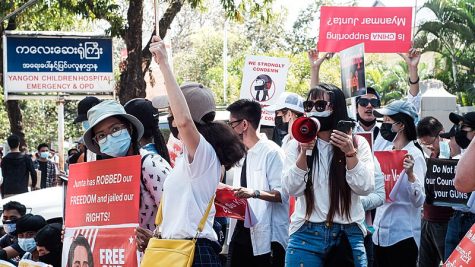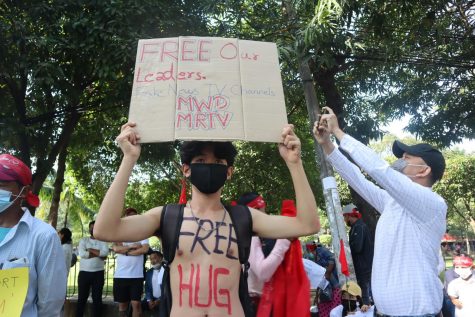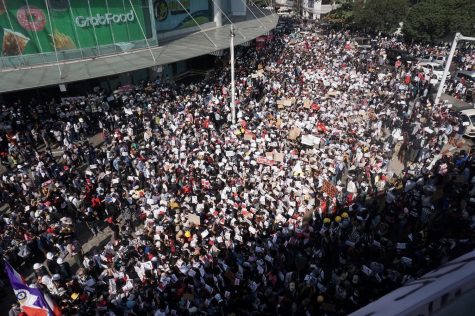The military coup in Myanmar and democracy in Asia
April 15, 2021

On February 1, Myanmar’s Tatmadaw (armed forces) staged a coup d’état against the democratically elected leader Aung San Suu Kyi and her party, the National League for Democracy (NLD). The military is detaining Suu Kyi, her cabinet and members of the Burmese Parliament. The junta justified the coup by claiming that last year’s election was fraudulent in addition to a number of personal accusations against Suu Kyi. In the weeks since the overthrow, hundreds of thousands of protesters across the country have been demonstrating daily for the release of Suu Kyi and a reinstatement of the democratic government. At least 710 people have died.
Since gaining its independence from the United Kingdom in 1948, Myanmar (alternatively called Burma) has been historically controlled by its military but with steady opposition from pro-democracy groups. The Tatmadaw was in direct control of the government from 1958-60 and then again for 26 years after a coup in 1962 until 2011. Notable pro-democracy movements include the 8888 Uprising in August, 1988, in which students led mass protests against the military government. Hundreds were killed in the following put-down. During this uprising, many modern pro-democracy leaders rose to prominence including Suu Kyi. The junta allowed a free election in 1990 but refused to relinquish control afterwards, despite citizens overwhelmingly voting for the National League for Democracy. In 2007 Buddhist monks led demonstrations, known as the Saffron Revolution, against the military government and specifically its removal of fuel subsidies, causing the price of fuel to inflate and the economy to decline further. Dozens died during the protest, including Japanese photojournalist Kenji Nagai.
In 2003 the state announced a “roadmap to democracy,” resulting in a new constitution in 2008, a transition to free elections starting in 2011 and the landslide victory of the National League for Democracy in the 2015 general election, placing Aung San Suu Kyi as de facto leader (officially State Counsellor, since a constitutional clause prevents her from being President).
Suu Kyi is the youngest daughter of Aung San, founder of the armed forces and leader and revolutionary in Burma’s path to independence. As punishment for her role in the 8888 Uprising, the junta placed Suu Kyi under detention or house arrest for almost 15 years off and on from 1989 to 2010, during which she won the Nobel Peace Prize in 1991 for that same role. Suu Kyi’s reputation has been questioned abroad in recent years however, over her inaction towards the persecution (and then genocide) of Rohingya people.
The Rohingya people are an ethnic minority in western Myanmar that are predominantly Muslim. In modern history they have been persecuted by the Burmese military and Buddhist nationalists and are among the most persecuted ethnic groups in the world. The Burmese government denies Rohingya people citizenship and the freedoms that go along with it. They have been forcibly displaced in recent years, culminating in a military crackdown and genocide in 2016 and 2017 that resulted in the deaths of tens of thousands and displacement of hundreds of thousands, many to neighboring Bangladesh. Suu Kyi and her administration fell under heavy criticism worldwide for their inaction to stop the crackdown. Suu Kyi faced the International Court of Justice in 2019 and denied wrongdoing on the part of her administration or the military in regards to the prosecution and violence against Rohingya people. The ongoing conflict damaged Myanmar and Suu Kyi’s reputation abroad, but she remains immensely popular in Myanmar, where she is seen as a champion of democracy.
Following the Tatmadaw’s overthrow, people across the country have been engaged in regular protests demanding the release of Suu Kyi and the reinstatement of the democratic government. Protesters have been nonviolent but persistent through forms of civil disobedience. Coordinated labor strikes and demonstrations have been widespread. Protesters have also organized a military boycott of businesses in which the junta has a controlling interest. In response to the protests, the military government has declared a state of emergency, imposed a number of restrictions and suspended rights of citizens. The junta has enacted martial law in some areas, restricting movement and assembly and placing a curfew. The Tatmadaw has worked with telecom companies to restrict internet access and censor media outlets. Police and soldiers have used water cannons, rubber bullets, live ammunition and other forms of force to try and disperse and intimidate protesters.

The crisis requires a “firm, unified and resolute international response,” UN Special Envoy Christine Schraner Burgener said to the UN Security Council. “Hard-won gains of the democratic transition and peace process are slipping away.” Burgener also stated “the whole country is on the verge of spiralling into a failed State” but that there is “still time to avoid the worst outcome.”
“The issues in Myanmar go much deeper than what the rest of the world sees in the news,” Maya Smart, Vice President of Madison’s Amnesty International Club, said. “After Myanmar was released from British colonization, the country’s infrastructure was basically left to fall apart. The country has been susceptible to governmental turmoil from the moment the U.K. left it in a lurch. The government that was responsible for Myanmar’s colonization should be the ones to step in and help stop the violence. It can be an act of reparation.”

The protests in Myanmar are similar to other protests in Asia demanding democracy since the end of the Cold War. Hong Kong, a pseudo-independent enclave of China, has been historically involved in conflict with its mainland over its special status and democratic values. In recent history, mass protests in 2019 and 2020 showed widespread democratic sentiments among people in Hong Kong when the Chinese Communist Party (CCP) attempted to regain some control through an extradition bill that would allow criminals in Hong Kong to be tried in China, where penalties are harsher and the justice system undemocratic. In 2014, mass protests called the “Umbrella Movement” took hold in response to the CCP’s attempt to reform elections in Hong Kong and effectively pre-screen politicians. Thailand has been embroiled in multiple coups in modern history and related unrest and conflict regarding the future of government in the country. Democracy in the Philippines has eroded under the leadership of Rodrigo Duterte, forming more of a dictatorship. Cambodia’s government is rife with corruption and has been under single-party rule since 2018. Burma’s struggle with democracy is among others in the region as people and leaders question and conflict over how they should be governed in a post-colonialist world.


